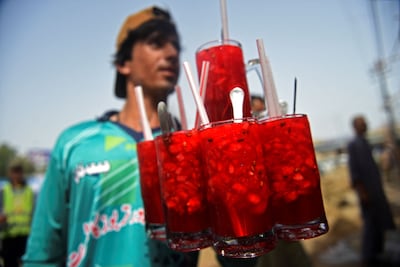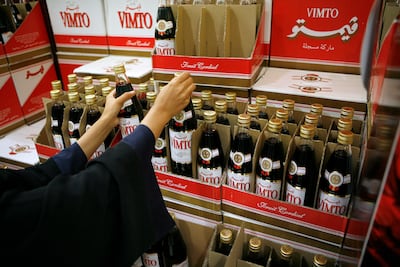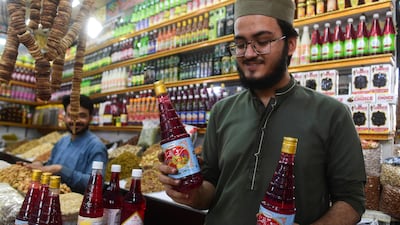A period of fasting can be a healthy reset for the human body, with studies showing its benefits in reducing cancer risks and hypertension and increasing brain function.
But how you break your fast can be just as crucial as the act itself, with the temptation to gorge on fast food and fizzy drinks ever present.
Popular drinks taken at iftar can add hundreds of hidden calories to the recommended daily intake, with one fruit-based beverage contributing almost a quarter of the limit for women.
Traditional Rooh Afza is a dark pink-coloured syrup made using rose, cooling fruits and herbs and is often added to milk or water to provide a refreshing drink at sundown.
One 100ml serving of the drink contains 414 calories – more than 20 per cent of the limit for women, which is 2,000 calories a day.
Fasting relieves the digestive system and helps adjust blood cholesterol levels.

It is also proven to improve glucose and insulin levels, but nutritionists say some people could be reversing the positive effects by consuming drinks loaded with sugars at iftar and suhoor.
"Popular drinks like Rooh Afza and Vimto are not recommended in Ramadan as they contain sugar and artificial sweeteners that can cause weight gain, tooth decay, and digestive problems,” said Mahmoud Elgendy, an internal medicine specialist at NMC Royal Hospital in Dubai Investments Park.
“They are made of water, sugar, grape juice and raspberry juice that contains citric acid, as well as natural flavours, colourings and sodium citrate.
“Vitamin C and D are added to make it nutritious, so overall, these drink do contain some healthy ingredients but are not a good choice of energy or a nutritional source.”
Calorie consumption on the increase
While the ideal calorie intake varies according to an individual's age, size, physical activity levels and metabolic rate, the recommended daily calorie intake is about 2,500 for men.
According to the UN Food and Agriculture Organisation, calorie loading is on the increase with the average person now consuming about 2,960 per day.
Europe and North America had some of the highest rates in 2021, with an average of 3,540 calories consumed per day, with Africa recording the lowest numbers at about 2,600 calories per person, per day.
“For the daily requirements of calories in Ramadan, people should aim to consume 2,000 calories split in half, 1,000 before dawn at the start of the fast and another 1,000 calories at sunset,” Dr Elgendy said.

“Liquids should include natural juices, milk and soups, and [fasters should] reduce the consumption of caffeinated drinks, such as coffee, tea and carbonated drinks.
“Water is the best choice to stay hydrated, it regulates the body temperature and helps with digestion.
“Drinking water between iftar and suhoor reduces the risk of dehydration, so it is a good idea to drink at least two litres of liquid a day.
“Natural fruit juices can provide energy and electrolytes, vitamins, potassium, magnesium and calcium, while herbal teas have antioxidant benefits and aid with concentration and focus.”
Rooh Afza is not the only beverage packed with calories that could be tipping people over the recommended calorie levels to maintain a healthy diet, as concentrated fruit drinks such as Vimto and Tang also add extra calories to mealtimes.












